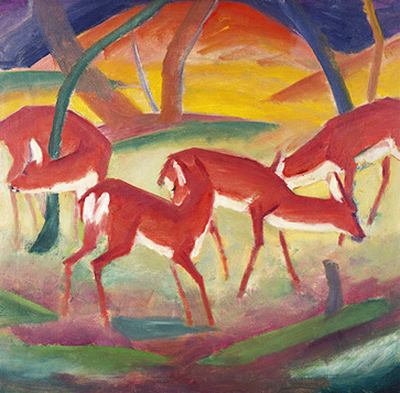Red Deer Grazing is a work of art by the German Expressionist, Franz Marc. The painting shows a fluid, bold style with blocks of bright colour.
The slightly abstracted shapes and vibrant colours strongly show the influence of Gauguin, particularly the tropical palette and smooth forms of his Tahitian series.
The scene in the painting has been flattened, with the deer and landscape becoming part of the same simplified, stylised image. Both deer and landscape depend on each other in the space.
They work in harmony, merging together to create a whole. Marc produced several similarly themed artworks, including Grazing Horses IV (Red Horses), 1911, oil on canvas.
Strong colour has a symbolic meaning in much of Marc's work, and this is seen in Red Deer Grazing. He used it as a shorthand to convey feeling and emotion. Along with Wassily Kandinsky and August Macke, Marc wanted to move away from the tradition of realistic, figurative painting.
Instead, they wanted to convey the essence or spirituality of a subject. This freed them to abstract images, focussing on emotional reactions and not technical representation.
Marc was born into a creative family. His father Wilhelm was a painter, and Franz grew up surrounded by his father's rural landscapes. Marc followed in his father's footsteps and attended the Munich Academy of Fine Arts.
Under the tutelage of artists including Gabriel von Hackl and Wilhelm von Diez , Marc started to refine and develop his painting and printmaking skills. Like many artists of the era, he spent time studying abroad.
Works by Van Gogh (1853 - 1890) and Gauguin (1848 – 1903) made a powerful impact on Marc, and he began to deviate from the traditional style of his father towards a more avant-garde one.




